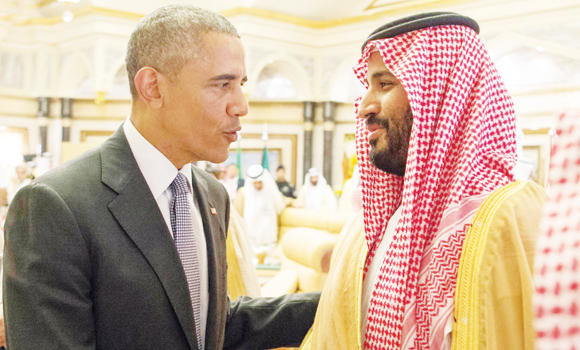RIYADH: The high profile Riyadh visit by US President Barack Obama to hold talks with Custodian of the Two Holy Mosques King Salman, on Wednesday, and leaders of the six-nation Gulf Cooperation Council (GCC), on Thursday, was strategically important with the two sides seeking greater consensus and stronger ties to address concerns of mutual interest such as Iranian meddling, the Syrian crisis, the Yemen conflict and a stronger alliance on combating terrorism.
During his meeting with King Salman, the US president on Wednesday said: “The American people send their greetings and we are very grateful for your hospitality, not just for this meeting but for hosting the GCC-US summit.”
Responding to the greeting, King Salman also offered similarly gracious words for President Obama saying, “The feeling is mutual between us and the American people.”
On Thursday, President Obama issued a statement saying the US continues to have “serious concerns” about Iran’s behavior even after the watershed nuclear deal last year.
After the GCC-US, summit King Salman lauded the constructive discussions and what has been reached between them saying, “In my own name, and on behalf of the GCC leaders, I thank you for attending this constructive and fruitful summit which will contribute in enhancing consultations and cooperation among the GCC states and the United States.”
King Salman also stressed the keenness and commitment of the GCC countries on developing historical and strategic relations with the US in order to serve common interests, and security and peace in the region, and the world at large.
Earlier, highlighting the strategic significance of the key visit, Deputy Crown Prince Mohammed bin Salman, second deputy premier and defense minister said: “We must work together to successfully overcome challenges facing the region, the most important of which are terrorism, instability and Iranian interference in the affairs of the Gulf countries.”
The Kingdom, which leads the coalitions fighting Houthi rebels in Yemen and the 39-nation broad global military alliance against terrorism, agreed during the talks to cooperate on security and counterterrorism measures in the wake of escalating threats from Iran and Daesh.
Moreover, the GCC countries and the US agreed to further intensify sea patrols to completely stop Iranian arms shipments from reaching Yemen.
“The US and the GCC will stage joint maritime patrols to stop Iran from supplying weapons to terrorists,” said Abdullatif Al-Zayani, GCC secretary-general, after the meeting between GCC defense ministers and US Defense Secretary Ashton Carter on Wednesday.
The Saudi-led coalition recently intercepted a cargo ship coming from Djibouti to the Hodaidah Port under the guise of carrying medical supplies, but actually carrying encrypted military communication equipment and other military hardware in containers originating from the Port of Bandar Abbas in southern Iran.
This was not the first such incident, as the coalition earlier seized ships on many occasions carrying Iranian arms for the Houthis.
The GCC-US also reached consensus for cooperation on helping to build a joint missile defense system for the Gulf countries and in developing special forces.
As counterterrorism was a major issue topping the agenda, the US urged the Gulf countries for more engagement in helping the Iraqi government fight Daesh and to rebuild areas where militants have been pushed out in order to help bring life back to normal in these areas.
During a string of sessions with the Gulf leaders, President Obama urged them to provide more support to war-torn Iraq to help the grand anti-terror coalition, backed by the US, take back ground from Daesh and restore peace in the region, thus making this group meeting an opportunity to mend strained ties and seek more consensus over key issues.
Moreover, just ahead of the crucial GCC-US summit White House spokesman Josh Earnest made a statement on the 9/11 bill saying President Obama does not support the legislation against Saudi Arabia over the Sept.11 attacks and would not sign it as by doing so we would be opening up the US to being continually sued by individuals from other countries.
Notably, a year ago in May 2015, President Obama hosted Gulf leaders at the White House and the Camp David retreat, the first meeting of the Gulf countries after a framework agreement on limiting Iran’s nuclear program.
Obama visit brings greater consensus for Gulf nations, US
Obama visit brings greater consensus for Gulf nations, US











